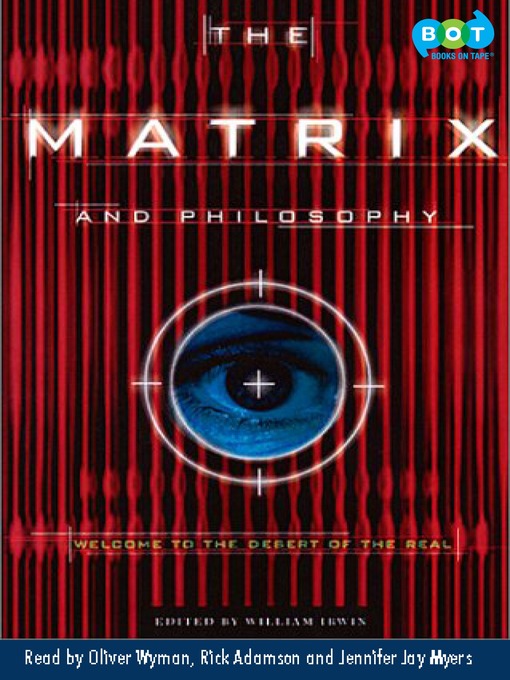- Home & Garden
- Cooking & Food
- Fashion
- Celebrity
- News & Politics
- Sports
- Business & Finance
- Kids & Teens
- Science
- See all magazines collections
-
Creators
-
Publisher
-
Release date
November 5, 2002 -
Formats
-
OverDrive Listen audiobook
- ISBN: 9780307933317
- File size: 195495 KB
- Duration: 06:47:16
-
-
Languages
- English
-
Reviews
-
AudioFile Magazine
Which pill would you choose--the red or the blue? Kings College Philosophy Professor William Irwin asked his colleagues for scholarly papers exploring philosophical aspects of the blockbuster 1999 film starring Keannu Reaves. Twelve of these papers, covering skepticism, nihilism, Buddhism, feminism, and neo-materialism, are collected in this audiobook version, read by Oliver Wyman, Rick Adamson, and Jennifer Jay Myers. The best of the bunch are Irwin's own contribution, "Computers, Caves, and Oracles: Neo and Socrates," which looks at THE MATRIX as a retelling of Plato's parable of the cave, and "Seeing, Believing, Touching, Truth," by Carolyn Korsmeyer of SUNY Buffalo, which explores sense perceptions and reality from, among other things, Descartes's thought experiments. Both of these essays are interesting and insightful without taking themselves too seriously. Unfortunately, with 12 philosophy professors analyzing the same turf, there's a lot of redundancy, and the narrators lack the enthusiasm to keep up the momentum. S.E.S. (c) AudioFile 2003, Portland, Maine -
Publisher's Weekly
September 30, 2002
The many faces of Keanu Reeves as hero Neo-Christ, Buddha, Socrates-are explored in these essays on the philosophical implications of the sci-fi martial arts blockbuster The Matrix, collected by the editor of Seinfeld and Philosophy and The Simpsons and Philosophy. According to the academics assembled here, when messianic hacker Neo kick-boxes the Matrix's virtual-reality dream-prison, he is really struggling with some of mankind's biggest conundrums: the nature of truth and reality, the possibility of free will, the mind-body problem and the alienation of labor in late-capitalist society. The tacit goal here is to make philosophy fun for the general reader by orienting it to pop-culture reference points, so while some articles contain rather dense philosophical jargon, most are pitched at the level of a freshman intro course. But only a few chapters delve into the movie's aesthetics; the rest seem to use The Matrix as a peg on which to hang a canned philosophy lecture. The results are occasionally engaging, as with David Mitsuo Nixon's nifty refutation of the "reality is just an illusion" conceit, but they're too often dryly academic and liable to elicit no more than a drowsy "whoa" from the movie's legions of fans.
-
Loading
Why is availability limited?
×Availability can change throughout the month based on the library's budget. You can still place a hold on the title, and your hold will be automatically filled as soon as the title is available again.
The Kindle Book format for this title is not supported on:
×Read-along ebook
×The OverDrive Read format of this ebook has professional narration that plays while you read in your browser. Learn more here.


